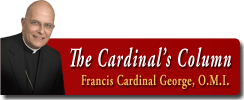‘You received without paying ...’
The Lenten message this year from Pope John Paul II is about giving and receiving God’s own life. Grace is pure gift, we have received it without paying; and the Pope then instructs us to “give without pay.” “Since we have received this life freely, we must in turn offer it freely to our brothers and sisters ... And the first gift to be given is the gift of a holy life, bearing witness to the freely given love of God. May the Lenten journey be for all believers an unceasing summons to enter more deeply into this special vocation of ours.”
I read the Holy Father’s letter along with the annual Archdiocesan financial report. God’s grace is pure gift; but it takes money to operate a parish or an Archdiocese. Sometimes it is said that the Church is rich. But the Church is rich like farmers are rich: they have lots of assets but no money. Those assets—church buildings, schools, institutions to serve the poor or the sick—do not generate money. They cost money to keep up and to operate. This seems evident enough, but it
doesn’t always seem well understood.
There are pockets of liquid capital in the Archdiocese which were not integrated into the annual financial report. The Archdiocesan cemeteries have a very large fund, but it is a fund dedicated to covering the costs of perpetual care according to the contracts issued when a grave is sold. It cannot be directly put to other uses. The same is the case for some capital funds which are accumulated from gifts to a particular institution or charity. Money may be fungible, but it cannot simply be transferred from one institution to another. Financial disclosure statements which don’t accurately trace the origin of funds and make their use transparent are instances of cooking the books.
There is an Enron scandal because it seems the company’s major executives and its accounting firm in some sense did cook the books. Perhaps, in the final analysis, the Enron scandal is less a story of failed oversight in a new economy than of plain old-fashioned greed. Once the free gift of life is totally translated into monetary terms, then no money is ever enough money. Money then replaces life and bargaining replaces giving.
Christianity is sometimes said to have a guilty conscience about money. Jesus died with nothing at all and preached that the poor are blessed. He condemned those who have riches and are content that others remain poor. His most radical disciples, like St. Francis of Assisi, have often followed his example literally. Men and women in communities of consecrated life own nothing personally, although their orders and institutions have assets. To despoil oneself of all wealth in Jesus’ name is a sign of faith in Divine Providence. But it is a testimony that makes little sense to anyone who hasn’t discovered that, finally, everything is gift.
Commenting on the Enron scandal, a business weekly magazine said succinctly: “There is no substitute for personal integrity.” A person of integrity oversees himself or herself. For Christians, the principle of integrity, what holds us together, is faith. The belief that a provident God accompanies us on every step of life’s journey and in everything we do keeps us from doing anything that cannot be done in God’s company and with the help of His grace.
The most important oversight exercised by the Church, therefore, is not over money but over the faith itself and over the lives of those who identify themselves as believers. This oversight is not always welcome. Some resent being called sinners, but when pastoral oversight and charitable concern for others falters, lives are sooner or later, in this life or the next, brought to destruction. When pastors are careless or negligent or themselves trapped in sin, then something other than faith integrates the lives of those given to their care: greed, lust, ambition for power, self-righteous pride.
While money is not itself of ultimate importance, how one uses money is often an indicator of developments in one’s spiritual life. During Lent, the Church tells us to pray more often, to fast on certain days and to give alms. Giving alms is not commanded just to help those in need; it is also necessary to help each of us live more freely, more gratuitously, more like the God in whose image we are made. This Lent, helping the poor is more urgent because the demands are more insistent. Catholic Charities of the Archdiocese reports that requests for food, clothing, shelter, rent and utility assistance, help for the basics of life, have skyrocketed. In Cook County, Charities now receives 2,000 calls a week, more than double the 900 calls usually received in the past. With a great increase in the number of homeless families, shelter beds are full.
It is important to stay with these facts, not to make us guilty but to make us generous. This Lent, our Holy Father calls us again to gestures of gratuitous love, to put the needs of God’s human creatures above any personal attachment to money, to let mercy rule our hearts. The Pope finishes his letter for Lent, 2002: “What better time is there than Lent for offering this testimony of gratuitousness which the world so badly needs? In the very love which God has for us, there lies the call to give ourselves freely to others in turn. I thank all those throughout the world—lay people, religious and priests—who offer this witness of charity.”
God bless you during this Holy Season of Lent.
Sincerely yours in Christ,


